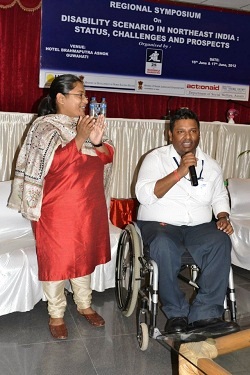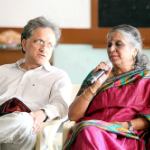Much has been written about the racial attacks against people from the Northeast in the so-called North Indian "mainland", but here's the truth: Young men and women from the Northeast are already winning coveted jobs, especially in the service sector, in Delhi and Mumbai and other major cities, because they are often much better-educated, better behaved, better groomed and have so much more attitude than their North Indian counterparts.
It's enough not only to take heart, but to position the region as the go-to place in the heart of the Indian sub-continent. Think about it for a second. With a population of only 40 million people, the Northeast can and must transform itself into a highly educated and skilled space that will energise not only the region, but also serve as a talented work pool which its adjoining nation-states can draw upon to upgrade their own industries.
Of course South Asia is among the most highly securitised spaces in the world, and if you look at a map carefully, the Northeast straddles most of these ancient and ongoing disputes. There is the unresolved border issue between India and China, with Arunachal Pradesh's Tawang district right in the centre of it, the on-off-on relationship with Bangladesh wracked by the animosities that largely stem from migration into Assam, the refusal to soften the frozen border between Sikkim and Bhutan, the instability of refugees from Nepal, and the chink in Mizoram's armour with Myanmar.
The time has come to imagine the Northeast not on the margins of the Indian state, whose centre of power lies in the north Indian city of Delhi, but as the heart of the North-by-North Eastern Asian landmass. It is from the countries or parts of countries that dominate this space that the forthcoming decades will draw its energies from.
In fact, it might be time to stop paying too much heed to boundaries - after all, these are only lines on a map - and start paying attention to dynamic connections between regions. With Myanmar awakening from its Rip Van Winkle-like isolation of decades, what better idea than to reinvigorate ties between itself and the neighbouring states of Mizoram, Manipur and Nagaland?
Arunachal Pradesh's connections with Lhasa have been at the heart of the India-China dispute - the Dalai Lama fled from Lhasa to Bum La in 1959 -- and both Delhi and Beijing are believed to have rejected the "soft border" option that makes the India-Pakistan 'Line of Control' in Kashmir so dynamic. But if pilgrims and Buddhist masters and even tourists can traverse the Line of Actual Control at Tawang, keeping their own passports close to their chests, it may help to dissipate some of the extra-heightened suspicion between Asia's largest powers. After all, why should the Nathu La pass in Sikkim be the only North-Eastern border post between India and China?
On Bangladesh, it might be time for all the chief ministers of the Northeast to play a much more active role. I saw, so clearly in Dhaka last year, when West Bengal chief minister Mamata Banerjee single-handedly wrecked the Teesta waters pact - and with it, the relationship between India and Bangladesh - how the other Northeastern chief ministers, also in Dhaka, flinched at her behaviour. So how about they get together now and pressurise Delhi to do what is best for the Northeast rather than only West Bengal?
The importance of the Northeast multiplies when you open the atlas a bit more. With Kunming in southern China becoming a magnet of sorts as Beijing arches to become a world power, connections with the Northeast become even more significant. Beyond Myanmar lies Thailand, Laos, Cambodia...
As the crow flies, these capitals are much more closer than the provinces of northern India where Northeasterners are treated with such ignorance and disdain these days. But if the Northeast can become the Centre of its own Asia, then Delhi can be relegated to its provincial outreach with Lahore and the rest of the west.
Can the Northeast do it? The rest of India waits for an answer.
Find us on facebook: facebook.com/TheThumbPrintMag







































